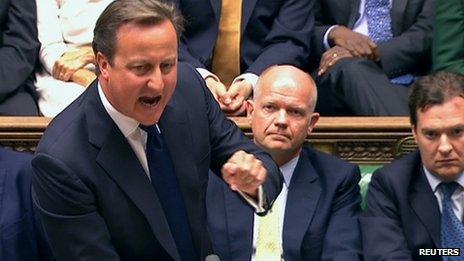Syria crisis: Welsh MPs debate military action
- Published

Prime Minister David Cameron opened the debate
Welsh MPs joined a debate about UK military intervention in Syria after the apparent use of chemical weapons in Damascus killed hundreds.
But the debate was on the principle only after the UK government dropped plans for a vote on immediate action.
Senior Welsh MPs expressed severe doubts about the UK getting involved.
Plaid Cymru parliamentary leader Elfyn Llwyd warned military action would "prolong the conflict and lead to further bloodshed".
Opening the debate, Prime Minister David Cameron said there was "no 100% certainty about who is responsible" for the attack in Syria, but told MPs "you have to make a judgment".
Rhondda's Labour MP Chris Bryant said: "Many of us on this side of the House, and I think on his as well, would want to say there is not a choice between action and inaction.
"It's simply a choice of what action should be taken and some of us worry that military action can exacerbate the situation rather than make it better and draw us in to mission creep which we would have very little control over."
Veteran Labour backbencher Paul Flynn, MP for Newport West, said he would oppose any resolution for military action.
He told the debate: "The fact that this House was told that there were weapons of mass destruction that were a threat to the United Kingdom and we were told again in 2006 that we went into Helmand Province in the hope that not a shot would be fired and the results of accepting those decisions are 623 United Kingdom deaths of our brave soldiers.
Rhondda MP Chris Bryant and Meirionnydd Nant Conwy MP Elfyn Llwyd expressed severe doubts
Plaid Cymru, who were opposed to the invasion of Iraq in 2003, also warned about military intervention.
Mr Llwyd told the Commons: "The serious question is why was a draft motion not presented to the United Nations before now? Why the delay?
"Now it's all very interesting referring to difficulties but diplomacy hasn't failed utterly, it was, after all, the Russians that pressed the Syrian government to allow the UN inspectors in on Monday.
"My colleagues - and myself - believe that any military action would prolong the conflict and lead to further bloodshed."
"We would call on the government to use its influence and also its relations with others to bring all of the relevant parties around the table to conduct talks.
"The chief aim should be to prevent further loss of life."
Former Welsh Secretary Cheryl Gillan reminded the House that there would be another vote before military action.
She said: "Anybody that does go through the lobby supporting the government tonight is not giving their approval for direct military intervention on the part of the UK."
She added: "There will be another vote."
On Wednesday evening, Labour had threatened to withdraw its support for the government's plan for a vote for immediate action saying a final vote must follow a UN chemical weapons inspectors' report.
The eventual Commons motion that emerged stated that a final vote on action should be held only after UN inspectors report on the alleged chemical attack.
The Syrian government has denied it is responsible for a suspected chemical weapons attack near Damascus on 21 August in which hundreds of people are reported to have died, blaming opposition forces.
UN weapons inspectors have been working at the site of the suspected attack. UN secretary general Ban Ki-moon said they need four days to finish their investigation there.
US President Barack Obama said on Wednesday his country was certain the Assad regime was responsible - though he also said he had not made a decision on a military strike.
- Published29 August 2013
- Published28 August 2013